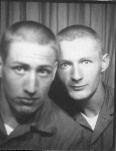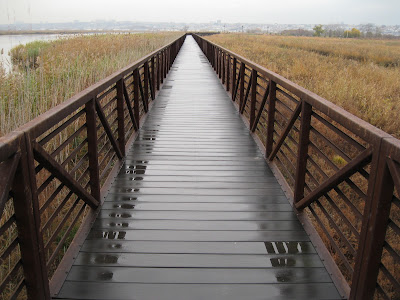64 – In search of the lost chord
Dan led me back down Argyle, passed the intersection with
Hollywood another three blocks to where it intersected with Sunset, where old
stores mingled with the emerging hip and upcoming Hollywood, Pete’s Flower
store tucked under the large arms of long-time Morgan Camera Shop -- one of those classic places that had made
its mark in the days of classic Hollywood and currently served as the bread and
butter for all the porno photographers – nobody looking too closely at what
they developed as long as the customer had money. Next to that sat Duncan’s
Inn, a relatively inexpensive dive truckers and the bus drivers from the
Greyhound station tended to frequent. And next to that, the Sunset Bridge Club,
and then a block away a tall ten story tower so out of place it seemed like an
alien ship had landed there, where Louise and I had previously sat near the
fountain during our excruciating walks around Hollywood earlier.
The Ed Sullivan Theater was up the street near Vine, and the
music store, and other things we had seen in our travels previously. But the Aquarius
theatre for some reason had escaped my attention, and it was towards this that
Dan steered.
“There’s always dope here,” he said.
Huge images decorated a large building that strongly
resembled a drive through bank with several pull up stations to the right of
the main structure itself. A large sign boasted of the current production of
“Hair,” although this was the traveling company, not the company that had
performed in New York and which Hank had routinely gone on and on about.
“Hair” had already gone from risqué to old hat since its
debut at the theater in December 1968, having put on nearly 500 shows. A hot
commodity for tourists, hippies and other freaks used its sidewalk as a kind of
bazaar, where they sold everything from used or stolen records to beads and
incense – and as Dan pointed out, a variety of drugs.
The theater was among one of the older establishments in a
city of movie stars, having been constructed in 1938, although originally known
as Earl Carroll Theatre. The name change coincided with the theatre’s
reconstruction for “Hair.”
Local celebrity Tommy Smothers – who was a frequent guest of
the rock and roll parties up in the canyons north and west of Hollywood – was
one of the key people behind the production.
Tourists, with or without tickets, crowded the sidewalk
outside the theatre, ogling the huge mural that had taken four different
artists to create when first done two years earlier, but which along with many
of the advertisements for the show had become tattered.
Many people waited for the break in the show when some the
actors came out onto the sidewalk, still dressed in their costumes (nobody came
out naked) and became instant celebrities.
Dan had apparently spent a lot of time here and so knew some
of the actors by name, or at least, as nodding acquaintances, and may even have
sold dope to them from time to time.
On this trip, he searched the faces of the crowd for someone
in particular.
“You have to watch yourself,” he told me as we weaved
through the crowd and around the blankets covered with merchandise on the
sidewalk. “You can get burned here or worse, might get bad drugs.”
The whole thing had already taken on the aspect of a trip,
flash cameras going off at intervals, sidewalk would-be Bob Dylans or Leonard
Cohens providing a somewhat sour sound track between the voices of the sellers
and buyers. Jesus Freaks along with their Hari Krishna counterparts filled in
between songs with odd chants.
“Ah Shit!” Dan hissed, then grabbed my arm, pulling me
aside, behind a group of tourists, mid-westerners from the sound of their
voices, their attention focused on the stage door through which they expected
to actors to emerge, Dan’s attention focused on the sidewalk beyond the
boundary of the theater in the direction of Vine where a pack of bikers sat on
their hogs, drinking Jack Daniels and howling – if not at the moon – than at
something above and beyond on they could see.
“What it is?” I asked, staring in that direction, not quite
certain what he was looking at, only that he shuddered with terror.
“Billy Night Rider,” he said, in a hoarse whisper, as he
peered around the shoulder of the fattest tourist, his handlebar moustache glistening
with a sudden sweat.
I looked more closely at the bikers, in particularly, the
loudest and largest of these, who chugged his whiskey the way other men might
beer, some of it dribbling down the corner of his wide mouth. He had long
blonde, unwashed hair, held down by a dark headband. Like many bikers that
prowled the streets of L.A., he wore a cutoff denim jacket, sun-tanned muscular
arms protruding from either side, thick with tattoos of naked women, snakes and
daggers.
Although he seemed preoccupied, his gaze roved through the
crowd like that of a bird of prey, searching for someone or some opportunity
that might give him some kicks. If he searched for Dan, it wasn’t evident, as
if he simply needed to size up everyone, dismissing each as not worth his
effort to hassle.
“What do you want to do?” I asked Dan.
Dan, Looking around in the other direction, his gaze pausing
at each shadow as if to determine if he could hide in any, and when none seemed
safe enough looked elsewhere, his eyes showing increasing panic as if he felt
trapped.
“We need to get out of here somehow,” he said. “If only we
had a distraction.”
This might have been a prayer since just then the stage door
opened and out of it came two men dressed as LAPD motorcycle cops, thick black
boots, tight black jeans, heavy duty leather jackets, with the array of
handcuffs and other gear, including holstered guns.
I glanced in the direction of Billy Night Rider, who stared
back at the emerging cops, a look of concern – if not panic – rippling across
his suntanned face. He finished off the bottle of booze, and then motioned to
the half dozen other bikers – and their biker gals, all kick starting their
motorcycles and roaring off, giving the cops the finger as they did.
Their exhaust fumes hung in the air around the crowd for a
long moment before Dan finally laughed.
“Stupid fuck,” Dan said. “The asshole doesn’t even know if a
cop is real or not.”
“These cops aren’t real?”
“Hell, no, they play cops in the play,” he said. “Come on.
Let’s get your dope before any real cops show up.”
But the man Dan intended to buy the acid from shook his
head, telling us “acid ain’t in right now,” and suggested we get some “downers”
he said were just as good. Dan asked if he had mescaline or mushrooms (he told
me were almost as good), but the man said there’s nothing like that on the
street either.
“If you want smack, I got plenty of that, nobody’s into that
old hippie crap.”
Dan got much the same answer for the less scrupulous dealers
he approached there, though some suggested we might find something over at the West
Hollywood Presbyterian Church.
“But that’s a scary scene, man,” one dealer said. “The fuzz raids the place a
lot, along with the other church with the blind minister.
Dan didn’t trust the blind minister, claiming he was “too straight” and felt he
cooperated too much with the fuzz. The other place was run by a minster named
Greek, a cool cat, Dan claimed, because he left the hippies crash on the church
grounds even though his congregation hated him for it.
I had seen signs for feed-ins there, as well as postings on
the wall of Free Press Bob’s bulletin board as a place to crash.
“A lot of the old churchgoers didn’t like the hippies
hanging out, doing dope, balling each other on the lawn,” Dan said. “A lot of
business owners kept calling the fuzz. The Sheriff’s Department raided the
place, busted people for bathing naked. Some of the people are raunchy there, a
lot of hard core runaways and down and out criminals. You can’t trust most of
them. They might have dope, but might well sell you vitamin pills. But it’s one
of the few places where if it exists, somebody there will be selling it.”



Comments
Post a Comment